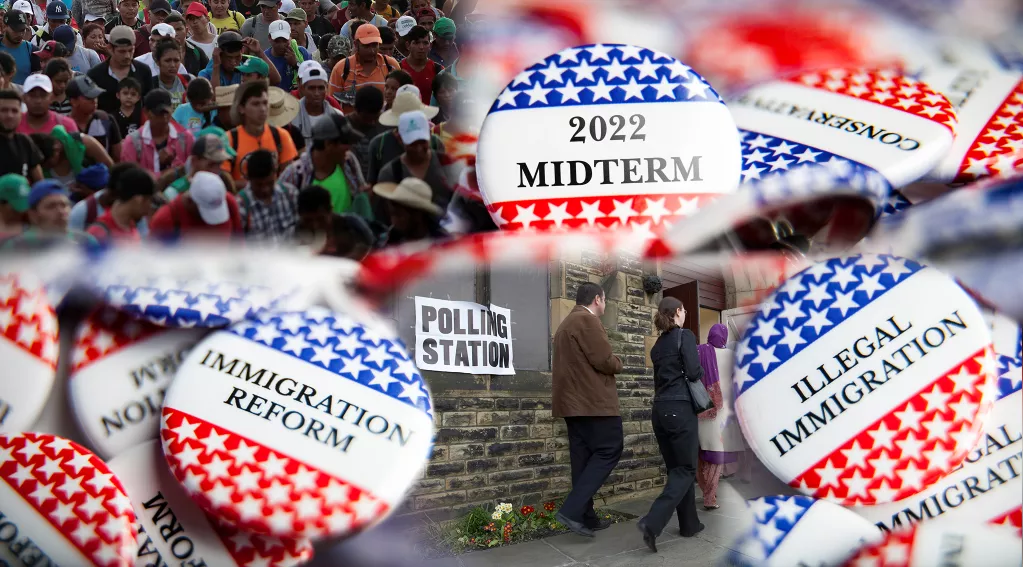The Midterm Elections and Immigration

In last week’s midterm elections, more than 53 million Americans voted for Republican candidates while approximately 50 million opted for the Democrats. The GOP has secured a slim majority in the House of Representatives – no doubt significantly slimmer than many Republicans hoped for, but a majority nevertheless – while Democrats will retain control of the Senate (with a December 6 run-off in Georgia deciding whether the Senate will remain split, or 51-49 Democratic). Although some races still remain to be called, it is not too early to discuss the overall impact of immigration on the elections, based both on exit polls and the results of certain elections and ballot initiatives. Where immigration was on the ballot, it was, more often than not, a winning issue. However, other issues – especially inflation and abortion – diverted much attention away from immigration and the Biden Border Crisis, particularly in states where the impacts of mass illegal immigration are less visible.
According to exit polling, 51 percent of voters trust the Republicans to handle immigration better, while 45 percent pointed to the Democrats. Moreover, Democrats lost significant support among Hispanics and Asians, many of whom are immigrants themselves.
Most exit polls understated the importance of immigration during the midterms because they asked voters to choose only one issue as the most pressing. In those cases, more tangible issues such as inflation and the economy had the greatest impact. However, exit polling commissioned by FAIR showed that when asked specifically about immigration, a whopping 83 percent of American voters said that the issue was either important or somewhat important to them in determining their vote. Here are some details:
- A majority (56 percent) see the southern border as either “not at all secure and out of control” or “somewhat insecure.”
- Sixty-four percent support completing the border wall, and 55 percent recognized that Biden policies have encouraged mass illegal immigration.
- Almost seven out of ten voters also believe that asylum-seekers should be required to file applications outside of the United States, rather than uttering that magic word at the border to simply enter the country.
- When asked about what the top immigration-related priority for the new Congress should be, half said we should secure the border and stop illegal migration while another 12 percent opted for finding and deporting those illegal aliens who are already here. Less than 9 percent picked amnesty.
In Texas and Florida, GOP governors Greg Abbott and Ron DeSantis were reelected in landslides. Both are famous for their strong stances against illegal immigration and busing of illegal migrants to sanctuary cities up north – moves which unmasked the hypocrisy of pro-illegal-alien Democratic mayors. In general, the GOP had a very good election across the board in Texas and Florida, two states strongly impacted by mass illegal migration and the Biden Border Crisis.
In New York state, the immigration issue – along with crime and inflation – also helped the GOP score victories in congressional races in an otherwise very blue state. New Yorkers felt the impact of the border crisis stemming from the migrant busing campaigns, as well as the Biden administration’s late-night flights into a suburban airfield (which, strangely, did not evoke the same level of ire from state and local officials). FAIR’s exit polling showed that 58 percent of New York state voters wanted Congress to focus on border security and enforcing immigration law (compared with fewer than 11 percent who chose amnesty).
Another telling result is that in overwhelmingly Democratic Multnomah County (which includes Portland, Oregon) voters rejected a ballot initiative to grant non-citizens the right to vote in local elections. This is a monumental shift in a state that, until this point, has been offering illegal aliens more and more benefits and privileges across the state.
But regardless of how one interprets the 2022 midterms and the impact of immigration and border security on voters, it is clear that the Democrats and their open-borders allies feel emboldened. The open borders lobby is already calling for amnesty and more cheap foreign workers. President Biden’s remarks that he does not intend to “change anything in any fundamental way” also does not bode well for the next two years in terms of positive immigration policy. While it is highly unlikely that the administration will reverse its open-borders policies, GOP oversight investigations in the House may at least shine a much-needed spotlight on the ongoing crisis. FAIR will continue leading the pushback, but we need you – as a citizen and patriot – to stay involved and promote the importance of the issue.

